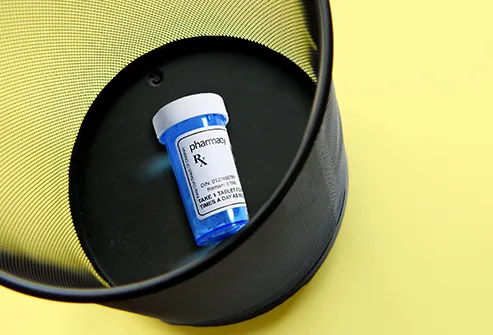Everything in there is meant to promote your health, but some items may have unexpected risks.
Are There Health Hazards in Your
Medicine Cabinet?
1/14
Cotton Swabs
These can be good for
putting on makeup, doing your nails, or any number of odd jobs around the
house. But never stick them -- or anything else, for that matter -- into your
ear canal. Earwax is a healthy part of your body’s natural defenses, not a sign
of illness. If your ear hurts or is itchy, or you feel like there’s something
in there, talk to your doctor.
1/14
Aspirin
If members of your
family share one medicine cabinet, be careful with this pain reliever. Though
it’s safe for most adults, older people who take blood thinners for a heart
condition should be careful with aspirin. Taking both can lead to bleeding in
the stomach or intestines. And never give it to kids under 2 or older children
or teens who are getting over an illness with flu-like symptoms. In those
cases, aspirin is linked to a rare but serious condition called Reye’s
syndrome, which can cause swelling in your liver or brain.
1/14
Other Pain Relievers
Nonsteroidal
anti-inflammatory drugs (NSAIDs) like ibuprofen (Advil, Motrin) and naproxen
(Aleve) can help with pain and swelling. But they also can thin your blood. If
you take prescription blood thinners, they can cause serious bleeding. If you
take them too often, NSAIDs may make you more likely to have a heart attack or
stroke. They also can be bad for your kidneys, especially if you already have
kidney problems.
1/14
Leftover Prescription Medicine
If your doctor gives you
medication for a specific condition, use it as directed, then get rid of it.
The best way to do that is to crush it and mix it with something no one would
want to eat, like coffee grounds or kitty litter, then put it in a sealed
plastic bag and throw it in the trash. If you take sleep medicine or strong
painkillers too long, you can start to depend on some of them. And if you use
antibiotics for the wrong reasons, that can lead to bacterial infections that
are harder to treat.
1/14
Medicines for Heartburn
Proton pump inhibitors
(like Nexium, Prilosec, and Prevacid) can ease the pain caused by acid reflux
and other conditions related to stomach acid. But using them for a long time
can make you more likely to have gut infections or make it harder for your body
to take in nutrients. If you have heartburn a lot, talk with your doctor about
all your options.
1/14
Chewable Antacids
They help get rid of
extra acid in your stomach that leads to pain or indigestion. But for some
people, they can cause constipation, cramps, and diarrhea. A certain kind
called acid blockers (like Pepcid AC, Tagamet, and Zantac) may also cause
headaches and dizziness and more serious side effects like confusion, chest
tightness, sore throat, fever, unusual heartbeat, and weakness in some people.
Call your doctor if you notice any of these signs.
1/14
Antihistamines
These can help with
sneezing, runny nose, coughing, and itchiness. But they also can make you
drowsy, lightheaded, confused, or nervous. They can affect your sleep,
appetite, and sex and cause vomiting, constipation, and diarrhea. Talk to your
doctor if you notice any of these when you take antihistamines.
1/14
Mouthwash
Be careful not to
swallow it. That can hurt your stomach or make you nauseous. You may even vomit
if you swallow too much. Kids under 6 shouldn’t use it because they’re more
likely to swallow some by mistake.
1/14
Antibacterial Soaps
Also called
“antimicrobial” or “antiseptic,” these have chemicals that are supposed to kill
bacteria. But they may instead help make the bacteria stronger and harder for
antibiotics to kill. And they don’t seem to do a better job of keeping you
healthy than plain soap.
1/14
Vitamin Supplements
Companies that make
these don’t have to prove they’re safe. Even if they are and you’re perfectly
healthy, too much of some vitamins -- including A, D, E, and K -- can cause
problems. Some can also affect medication you take, so talk to your doctor
first.
1/14
St. John’s Wort
Used by some people for
depression, this herb hasn’t been approved by the FDA, and it’s not clear that
it really helps. And if you take it along with antidepressants, it can lower
your body temperature and cause trembling, diarrhea, confusion, and muscle
stiffness. It also may keep some drugs used to treat heart problems, high
cholesterol, and erectile dysfunction from working like they should. Check with
your doctor to see if might be helpful for you. If not, toss it.
1/14
Nonprescription Drugs for Sex
A number of herbal
supplements with “natural” ingredients claim to boost sexual health in men. For
the most part, they don’t seem to work, and some can cause side effects. Many
have ingredients that aren’t listed, like phosphodiesterase-5-inhibitors, which
can affect other medicine you take.
1/14
Weight Loss Supplements
Don’t trust anything
that “guarantees” fast weight loss or claims to be an “herbal alternative” to a
medicine approved by the FDA. It may have unsafe ingredients. The best way to
get to a healthy weight is to do it slowly with a well-balanced diet and an exercise
plan. Talk to your doctor if you’re not sure how to start.
This tool does not provide medical advice.
| 

মন্তব্যসমূহ
একটি মন্তব্য পোস্ট করুন